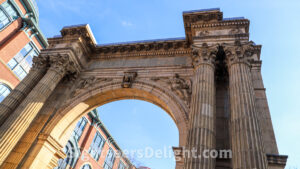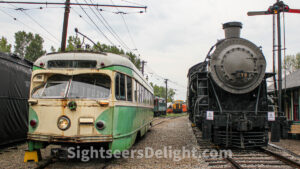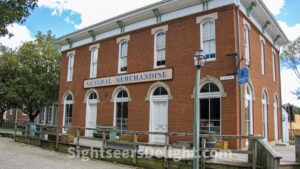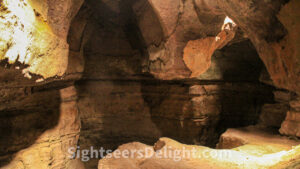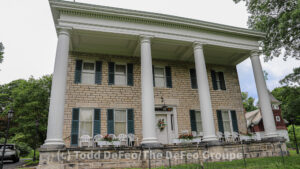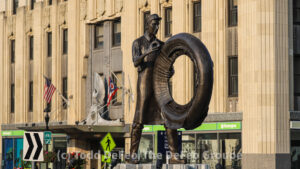McFerson Commons is a 2.2-acre park in Columbus’ Arena District. McFerson Commons was previously named Arena Park. The park’s centerpiece is the Union Station arch. Daniel Burnham & Co. designed Union Station. The arch was salvaged before the demolition of the station in the 1970s.
43215
Founded in 1948 and incorporated in 1950, the Ohio Railway Museum is among the oldest railroad museums in the country. The museum operates over the former Columbus, Delaware, and Marion Railway right-of-way. One of its key locomotives on display is Norfolk & Western No. 578, an American Locomotive Co. 4-6-2 “Pacific” E2a steam locomotive. Built in March 1910, the steamer is said to be one of the last surviving E2a locomotives built for the Norfolk and Western Railway Co.
43085
Construction on the Ohio Statehouse started in 1839, and the structure was completed in 1861 and is considered to be a significant architectural accomplishment. The edifice, the seat of Ohio’s government, has been restored to its 1861 appearance. To learn more about the Buckeye State can venture to the Ohio Statehouse Museum Education Center on the ground floor of the statehouse. Visitors can participate in a tour or wander the museum at their own pace. A monument to President William McKinley, a native of Niles, Ohio, stands in front of the statehouse.
43215
The Ohio Historical Society operates the Ohio Village living history museum. The 15-acre museum, which opened on July 27, 1974, aims to give a firsthand view of life in Ohio during the Civil War. The village is home to 22 buildings, including a mix of reproductions and historic structures relocated to the site.
43211
The Old Colony Burying Ground was established in 1805 and is the final resting place of many early Granville pioneers. The first burial was in 1806, and the oldest surviving gravestone is dated 1808. It is the resting place for veterans from the Revolutionary War, War of 1812, and Civil War, along with ministers, farmers, industrialists, physicians, mothers, children, and other citizens of Granville.
43023
The Olentangy Indian Caverns, located in Delaware, Ohio, north of Columbus, are a series of natural underground caves formed millions of years ago by an underground river that cut through the limestone rock. The cave’s passages and rooms occupying three different levels. According to the caverns’ webpage, Wyandots used the caverns over the years as a place of refuge from both their enemies (the Delaware Indians) and the weather.
43015
The Granville Opera House was destroyed by fire on April 7, 1982. The historic edifice was built in 1849 as a Baptist Church and moved to a location at the corner of Broadway (Ohio Route 661) and Main Street in 1882. The church tower’s bell is still on display in a park built on the site of the Opera House. The bell first rung on June 29, 1872, to announce the death of the Reverend Samson Talbot, Denison University’s fifth president. The bell was also know for sounding on the hour and as the fire alarm.
43023
Colonel Simon Perkins, the son of Akron’s co-founder, General Simon Perkins, built the Greek Revival Perkins Stone Mansion, which was built between 1835 and 1837. Isaac Ladd of Warren, Ohio, possibly designed the mansion. The Summit County Historical Society purchased the mansion in 1945. The house, today a museum, interprets the Perkins family and Akron’s history.
44320
The Rock and Roll Hall of Fame, established in 1983, was dedicated in Cleveland, Ohio, on September 1, 1995. The museum documents the history of rock and roll, not just those who have been inducted into the Hall of Fame. Inductees are honored in an exhibit located in a wing that extends out over Lake Erie.
44114
Akron unveiled the 12-foot-tall Rubber Worker cast bronze statue in May 2021. It stands in a roundabout at the intersection of Main and Mill streets. The statue depicts a rubber worker wrapping a tire and is based on the cover image of “Wheels of Fortune: The Story of Rubber in Akron,” a 1999 book by David Giffels and Steve Love. The ceremony included Akron Mayor Dan Horrigan and Zanesville-based sculptor Alan Cottrill.

